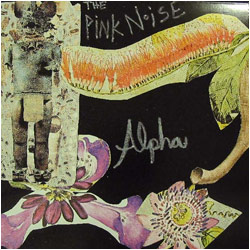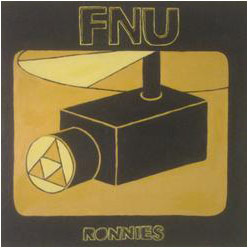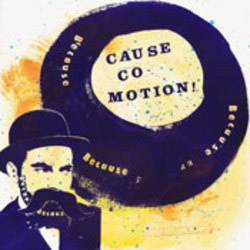
Alpha
Almost Ready
Montreal’s prolific Pink Noise didn’t take much time to follow-up last year’s excellent Dream Code, and in the scratches of Alpha there’s nothing sophomoric about the duo—either you think their sci-fi acidic take on the Suicide model is devastating or disastrous. I’m bound to hear a bit of both depending on mood. From the outset, “Girls on the Street” mines that cheap-blotter, bad-trip paranoia of the Chromes and Trux of the universe. The kids know those guitars don’t tune themselves, but they prefer to let them melt into atonal smears and spizzle out like steam engines dirt-dry from the heat. It’s skeletal, minimal, punching all the wrong buttons but somehow keeping it together.
“Fortress” is where things get interesting, as the usual idling beats and buzzing riffs are sprinkled with pixie synths, the kind that were likely left for dead in a Quebecois public access studio circa 1983. This is what I absolutely adore about Pink Noise, those miniature feelers attached to their claustrophobic throb that let the listener know they’re sharing the same guffaws with you. This ain’t serious business, nor is it caveman slop. Just give “Buzzsaw” or “Big Zero” a spin, you can almost dance to their groove n’ exhaust, though you’re just as likely to choke on the fumes. Getting past the naivety of it all opens a whole lot of doors. Kind of like spitting on modernity and urbanity, dialing back to the simple tools that control “Go Downtown,” megaphoned in like a band stuck in some faux-jam, post-punk, synth-coiled purgatory. Grotesque stuff indeed.

FNU Ronnies ep
Night People
It would be detrimental to try and explain the Hospitals’ landmark album Hairdryer Peace out of the equation when referring to this new one-sided 12-inch from Philly’s FNU Ronnies. After all, anyone who’s heard Hairdryer Peace knows that the record drew a line in the tar and has dared any fool willing to try their hand at this nether-fidelity to cross it. The Ronnies take the physical challenge and attack it with abject grace on “Golem Smoke,” the nine-minute plus knuckle-scuffing centerpiece here. And by nether-fidelity, I’m talking about reaching in deep for the core of the standard no-fi recording, crushing it with death-dirge drum and bass sturm und drang, then scattering the remains among the layers above the crust.
The results reveal tinny echoed nightmares at high frequencies, ultra-guttural churning in the lowest of depths, and a mid-range that destroys all spatial balance—not to mention that dimensional sensation that comes from television with no picture, switched on in a room of darkness. The sonic fuckery continues through the proceedings onto the last track “Herb Albert,” which is more an exercise in righting yourself physiologically to get those fluids replenished. I can’t say one way or the other if this is enjoyable without pharmaceuticals or if the Ronnies come close to matching the Stonehouse watermark, or if they even care. But what I do know is this is an intriguing listen from front to back, a face-melting bummer in collage form giving a glimpse at the raw horror that could come from an actual full-length from these cretins.

Because Because Becuase ep
Slumberland
Could caUSE co-MOTION be maturing, getting in touch with their feelings a bit more than normal, slowing down? I hope not, as the last time I saw them live they were constantly crashing into each other, engaging the crowd into fits of head-bobbing and hand-clapping, geeking out on their own special brand of jangle-pop. It was a marvelous thing to behold. Thank goodness they’ve kept to the formula with Because Because Because, a precious EP of six-songs in fewer than 15 minutes, because I’m not sure I have a sweet tooth that could endure a full-length of this fluff. Though the jangle still remains and the band has not strayed too far from the C86-in-a-cave histrionics that have fortified them with an after-school snack-esque earnest, on this quaint collection they appear to have gained some introspection. On “It’s Time,” they quip that you can “take away the fear/with all those beers.” That’s psychiatry for the broken-hearted on a drifter’s nickel. Shedding youth for increased sparkle and slightly slower shimmy is very welcomed at this point. I’m happy to trade-in the ramshackle version for this newly discovered melancholy, where on a song like “You Lose,” the chord progressions become more complex and you’re left with a foil to all their party-pop. After all, even the chirpiest of mods get the blues when the rainclouds roll in. These are gold-star tunes that honestly never age.
Kevin J. Elliott
PRIMITIVE FUTURES
Introducing... Ganglians
TV Ghost and Black Lips Club Singles
Introducing... The Beets
Captured Tracks
Psychedelic Horseshit, Golden Oldies
The World's Lousy With Ideas Volume 8
Singles Club Catch-Up
Introducing... Fungi Girls
Sacred Bones Spring '09 Singles, Part II
First Installment in the Hozac Hookup Klub
Novak Goes Solo (Again)
Sacred Bones Spring '09 Singles
Introducing... The Gluons
The Columbus Discount Dead of Winter '09 Round-up
